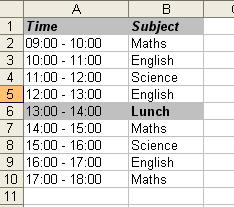Monthly Archives: January 2012
A Procrastinator’s Guide to Revision
Exams are an unavoidable part of life for most students, and so it figures that we should be taught how to revise properly, right? Well if your experience was anything like mine you were just told “to revise”, but given no clear direction how to revise. Well after years of experimenting with different methods I’ve finally found a way that works for me, and I thought I’d share it here. Who knows one day a stressed-out student may find their way here and it may help them out.
STEP 1: Make a timetable
This isn’t a new idea, however actually sitting down and writing it out and sticking to a timetable has helped me keep the procrastinator inside of me quiet. It seriously helps and lets you focus. HOWEVER there are a few key rules that I use when making my timetable:
- Study in blocks. It’s very difficult to concentrate for more than 1 hour on a single subject, so after you’ve studied one subject in your first block, change subject in your second block. Make a step-by-step plan.
- Be consistent. I have found that I can keep decent concentration in a revision setting for about 45-60 minutes at a time. So for ease I make each block 50 minutes long, with a 10 minute break.
- Take breaks. Make sure you stop what you’re doing when your alarm goes off and do something completely different and unrelated to revision; this gives your mind time to process it and refreshes you for the next session. (I’ve found that playing on my guitar, playing at my basketball hoop or even doing chores like washing up are good break activities.)
(Basic timetable example, you can actually got a lot done in a day – don’t forget to take the breaks though!)
STEP 2: Sort out your revision area

Having a quiet area free from distractions is ideal for revision. However, if you’re an extravert like me that needs that extra stimulation to concentrate then incorporate that in to your area.
- Make sure it’s clean and uncluttered. For me any mess is a distraction, so I either clean up, or move it out of sight.
- Make sure you’re comfortable. I either revise at my desk, or sat up on my bed; wherever you revise you’re going to be sitting in the same place for 50 minutes, so make sure you’re comfortable. (I’ve actually read that revising outside is really good, but have never tried it myself)
- Get free from noise distractions. For some people this’ll mean silence, and that’s all good as long as you can concentrate. For me silence is deafening and there’s not enough stimulation for me to concentrate, I have to have music in the background. Anything without words and not too loud is great for revision. (I’d recommend Andy McKee, or anything like chilled out classical music)
- Get the atmosphere right. Lighting is the first thing here, natural light if you can, but make sure it’s not too dark so that you have to squint. (This next bit will sound weird) Even try a scented candle! I’m not sure why this works for me, whether it’s the constant olfactory stimulation, or whether I just find it relaxing, but it helps me!
STEP 3: Stop surfing the net!
This one is an obvious one. It’s way to easy to just think “I’ll just have a quick look on Facebook” and then realise 30 minutes late that you’re on Wikipedia learning all about the Platypus (which by the way you should do, they’re awesome). If however the internet is part of your revision then try and limit the distractions available to you.
BONUS TIP – I’ve actually found the new Google Chrome amazing for this as you can have different user accounts on there. So I have one normal account, and then one account just for work, with all the journal databases, google scholar etc that I need for work… but with NO Facebook! :p
STEP 4: Reward yourself.
Revision is difficult, so after you’ve completed one of the major topics you’ve set as a goal, make sure you reward yourself! Not only are rewards fun, but your brain may even begin to associate hard work with rewards and begin to make revision a bit easier for you. (You can always hope!)
STEP 5: Get some gum!

Chewing gum has actually been shown to improve your cognitive functioning, and it definitely helps me with revision and in exams as well.
Well, there you have it! Those are some of the techniques I have used that has helped me in my revision and has kept me concentrating for the amount of time I need to (which is no easy thing I tell you!). Hopefully that might help some of you in the future.
Don’t stress too much and good luck with your revision!
Ste
